Suit Yourself
by Lindsey Godfrey Eccles
This afternoon while I’m showing a new listing the weather finally turns, and when I put on my rain jacket I find something in the pocket that I should have thrown away a year ago. I continue the walk-through, showing my client the rock fireplace, the exposed beams and the “lodge” feel – he’s a nice young guy, born overseas, polite and sophisticated, the kind of tech money we depend on now – but the whole time I’m also palming a children’s puzzle piece, exploring its shape, noting the way it fits into my hand. By the time we get to the chef’s kitchen I am feeling too warm. Breathless, and a little nauseated. I have to duck outside, and I sit down too hard on the damp stone steps. My client is nice about it, but he’s spooked. As we shake hands and I watch his car go down the gravel drive I know I won’t hear from him again.
I’m finding it hard to care. I pull the piece out of my pocket. It’s from the cheap kind of puzzle, hasn’t been treated well, and the shiny paper has almost come loose from the cardboard. I slide out from under the porch roof and run my fingers over it, letting the misty drizzle cool my cheeks and the back of my neck. I don’t want to think about the puzzle piece or where it came from or why it’s in the pocket of my rain jacket. But what the hell.
I’m in my mid-fifties, and I live alone, which is absolutely fine with me. I’m not married anymore, and I don’t have any children. I do have a niece who lives in Florida. Amanda. She’s just three years old now, and she’s the light of my life – that is embarrassing to say, but it is exactly what I mean. I can see things more clearly when she’s around. I used to go down there every few weeks or so to see her, but my last visit was more than a year ago, when my brother kicked me out of his house seven hours before my flight.
I should say that I never got along with Stevie all that well when we were kids. He’s a lot younger than I am, and we’re just different. He didn’t finish college, and I did, and he thinks that means I think I’m better. I do think I’ve done more with my life than he has. That sounds wrong. What I mean is that I’ve gone farther. The distance from where we started and where we are now is farther, for me. For example, Stevie tells jokes that make me uncomfortable. I don’t think he’s a racist but on the other hand, I would have trouble defending him to someone else who thought he was. Sometimes, I want to ask him, haven’t you been paying attention? Haven’t you learned anything at all?
I always loved Stevie, but we weren’t close, and after our parents retired and moved to a golf course in Southern California we didn’t see each other much. The gap between us always felt faintly embarrassing to me. It’s a question, usually unspoken, but a question, when I mention Stevie to somebody. Your brother is twelve years younger? And they wonder. But Stevie married Whitney, and now they have Amanda.
Things were getting better between me and Stevie. He likes it, or did like it, when I visited, and for a while he was sending me photos and videos every single day. I watch them over and over now, sometimes while I’m on the phone with a client or another agent. There is one video of Amanda jumping into foam pit one of their neighbors built in his backyard for the kids. The foam pit is safe, I guess, but the way she launches into it, belly first, it gets to me. She is so brave. I watch her over and over, flinging her head back, not even looking at the pit, not even watching where she is going. She lands, rolls, stands bottom-first and lifts her arms for someone to pick her up.
But all of this is how it was a year ago, not how it is now. From what I understand, Stevie and Whitney – she’s his wife, did I mention that? – have been having problems, as they say. Stevie is more or less a stay-at-home dad, though I doubt he would describe himself that way. He does some kind of freelance marketing, I think, but he doesn’t work much, and he doesn’t pay the bills. This is okay with me, and I think it’s okay with Whitney, but I don’t think it’s okay with Stevie. Whitney is a nurse practitioner in the maternity ward of the county hospital down there in South Florida, where they live. They live on a golf course too, like our parents, but it isn’t very nice. A little embarrassing, mostly flat, not many trees. People drive golf carts around on Stevie’s street as if they were wealthy people of leisure, but to me they just look like they can’t afford cars.
Anyway, Stevie doesn’t work, and he stays home with Amanda. They can’t afford day care on Whitney’s salary, even with overtime. Stevie loves Amanda. I can tell, from the photos he sends. He likes to dress her up. She has cheerleader outfits for the Dolphins and the Marlins and the Hurricanes. We’re not even from Florida originally. What gets me isn’t the outfits, though, so much as the way that he does her hair. When he dresses her up he always puts her hair in braids, and not just the simple Pippi Longstocking style sticking-out braids, either. He can do it all – French braids, the braids that look like fish skeletons, you know, intricate stuff. He can do the braids that make her look like a Bavarian barmaid that snake all around her head. It’s amazing what he can do. I don’t know where he learned these things. My mother never braided my hair, and even if she had, he would have been too little to notice.
It isn’t easy, I don’t think, even for a man in his generation, to stay home and take care of the kids. He must get lonely, and he must have doubts. I am not sure I could have done it myself, if things had worked out differently for me.
Stevie’s house is like a shoebox, a giant baby blue shoebox, lined up alongside dozens of other shoeboxes painted in various shades of pastel. I always felt uneasy, walking down that street, which doesn’t have sidewalks or even a curb, but just sort of slopes down into a shallow drainage ditch. Before the last time I had never visited during a big storm, but anyone could see that it wouldn’t take much to flood this whole neighborhood. When I take Amanda for walks we stick to the middle of the street, which is okay, because the only traffic is retirees in electric golf carts. Amanda likes those; she points at them and says “golf carts!” “Are those cars,” I ask her, and she shakes her head all the way side to side with a big smile on her face: “Those are golf carts!”
The day before the morning Stevie kicked me out of his house was a Sunday and because it was September, that meant football. I don’t watch the NFL myself, but I don’t mind the game. It reminds me of when I was younger – there were so many afternoons in New Orleans at the bar I tended in the Quarter, with every sort of person walking in and out and the game on all day long. And it’s something to talk about when there isn’t anything else. I am sitting with Amanda on the pale green carpeted floor in the long hallway that connects the rooms of the shoebox like buds on a vine. We are putting together a thirty-five piece puzzle, which is a little old for her, but she is remarkably good at puzzles. This is a jungle scene, with every manner of African animal peeking out of a tangle of vines and leaves – including some that I am pretty sure belong on the savannah, not in the jungle. I have my back propped up against the wall, and Amanda is sitting cross-legged on my lap. It is hard to put the puzzle together on the soft carpet because the pieces wouldn’t stay joined when you try to add another piece, but there isn’t a free table in the house. We do the best we can.
“Where’s the rest of the elephant, honey?”
Amanda frowns at the piece in her hand, then holds it out to me.
“Nope. What color is the elephant?”
Stevie pounces on Amanda out of nowhere. “The elephant is purple!” he shouts, and he lifts up Amanda, who cries “Purple Daddy!” The puzzle piece falls on the carpet.
“Hey,” Stevie says to me, holding Amanda over his head like a trophy he’s just won. She is giggling and kicking her legs. “How about we invite some friends over for the game later?”
“How ‘bout that?” Amanda says.
“Um,” I say. It’s the last day of my visit, and I want to spend it with Amanda, and plus there are some things I want to discuss with him and Whitney. Just some suggestions. I’m not that kind of older sister – I would never tell somebody how to raise their child – I’m not my mother – but I have a couple of suggestions. Plus, I don’t like the way he said it, as if he hasn’t already invited his “friends” over, as if I really have any say in it at all.
“Of course not,” I say. “That’s fine.” Stevie gives me a look. I’m not always very good at hiding my feelings. “That would be fun,” I say, stretching my lips into a smile.
“Great!” He holds his hand down to me. “Want some help up?”
I shake my head and brace myself against the wall to stand. Stevie is already walking down the hall with Amanda held high, her auburn curls bouncing against the ceiling with the rhythm of his steps. He knows I’m watching.
In the kitchen Whitney is cooking. Or doing what passes for cooking in this house. Sometimes it seems like days pass before I see these people sit down to something I recognize as a meal. Whitney is digging through the cabinets pulling out bags and boxes, then reaches into the fridge for a three-quarters-full quart jar of something viscous and pale yellow. My stomach rolls a little. When she notices me watching she smiles brightly.
“Jackie! Want to give me a hand?”
I nod and walk around the kitchen island. I grab a saucepan from the drying rack where I left it earlier that morning and reach my hand out for the jar of yellow. Nacho Cheez. It is too thick to pour, so I try shaking it over the pan, and when that doesn’t work I run a little bit of water from the tap, close the jar, and shake it. It pours like a charm.
I start when I notice Whitney watching me.
“This looks really good,” I say. She smirks and turns back to the cabinets.
I’m not sure how to handle Whitney. She seems to care about my brother, and she’s pretty, though maybe fifteen pounds overweight. She used to be a dancer, apparently, but that is hard to imagine. Now she works in a hospital and supervises a team of about a dozen other nurses, pulling three or four long shifts a week plus all that paperwork. I appreciate that she supports my brother and my niece, really I do. I just wish she could be home more. Amanda misses her mother.
I turn the electric burner under the saucepan on low and find a little plate to put under the serving spoon I’m using to scrape up the yellow goo from the bottom so that it doesn’t stick or burn. If there were an exhaust fan or a hood I would turn that on, but there isn’t. I turn to Whitney.
“Maybe I’ll take Amanda to the park before the game?”
Whitney frowns a little, then smiled again. “The game,” she repeats. “Yes, that sounds like a good idea. It’s so kind of you to come help us out.”
The park isn’t actually a park, but it is a good excuse to get out of the house. At the end of the road, where the development ran out of steam in an open marsh, there is one lot with a driveway but no house. It has been leveled, or built up, or whatever they do in this part of the world where developed land has to be wrestled from the swamp, but no house was ever built. It’s okay for playing so long as you keep a close eye on Amanda, because God knows what would happen if you let her wander off the abandoned plot into the tall grasses and wetlands beyond. You know the stories you read about alligators appearing out of nowhere and pulling little kids under the water? I can’t think about it. But I know other neighborhood kids play here sometimes, because we sometimes come across a deflated basketball or a plastic doll with multiple amputations in the scrubby weeds. It’s like a sad little treasure hunt.
We haven’t been there long when Amanda starts complaining about being hungry, which, to be fair, she probably is, so we walk back. The sky is low and close, like a winter hat I don’t want in this heat, and I have learned to be wary of ominous skies. It isn’t like where I live now, in Western Washington, where the clouds can hang over you for days without giving up more than a drizzle. Here, clouds mean business. Amanda pulls her hand out of mine and runs up the cement walk to her house, startling me. I look around and see two or three cars I haven’t noticed before, big shiny cars alongside the rows of pink and yellow and blue shoe boxes. The cars seem so much more permanent than the homes.
Inside the party has started. Rap music blasting away like no tomorrow, like it isn’t the middle of the day on Sunday. I stoop a little and rest my hands on Amanda’s shoulders. “Shall we go find your mama, little honey?” I ask. She nods, slowly, with a tiny frown etched between her brows.
I have to tell you a little bit more about Whitney. I admire her. It isn’t easy to do what she does, support a family on a nurse’s salary. But, honestly, I don’t understand her. I know this makes me sound old, and I feel old when I talk to her. And I don’t understand her relationship with my little brother. He treats her well enough, from what I can see, but she always has to check in with him. Do you know what I mean? Not just about important things, like what kind of car she’s going to buy, but about everything. How Amanda will wear her hair that day. Whether the jeans Whitney is wearing look all right. And sometimes it seems to me that Stevie will say, seriously?, or you’ve got to be fucking kidding me, for no other reason than to remind her that most of the time she is wrong.
“Here’s your mama,” I say, as we work our way down the hallway to the little kitchen at one end of the house. Whitney is still standing over the stove, but the pan of yellow goo has been set to the side to congeal. She is chewing thoughtfully on a tortilla chip while she stares at a pot of water on the burner, uncovered, tiny bubbles forming and releasing from the bottom of the pot, well short of a boil. A half-empty package of discount macaroni rests on the counter next to the stove. “I decided to cook something healthy instead,” Whitney says.
“No like it!” Amanda screams suddenly. “No like paaahsta!” Whitney flinches and her shoulders rise up around her ears.
“It’s okay, honey,” I say, lifting Amanda to my hip. “Something healthy.”
“Pasta is yucky and bad!”
Whitney sighs and folds her arms across her chest. She starts flexing and pointing her left foot, dragging her toes along the green linoleum of the kitchen floor. Green to match the carpet.
“You don’t have to eat it,” she says. “Mama’s just a little tired of chips and dips, that’s all.”
“How about I cook something?” I say. I love to cook. On Saturday mornings I might drive an hour both ways just to visit the farmer’s market in Tacoma. “How about I roast a chicken? That makes a lovely Sunday supper. And I could mash some potatoes to go with it, with maybe a little parsley sprinkled on top, for a bit of green.”
Whitney looks at me as if I am absolutely insane.
“Pars-ley?” Amanda says, frowning again. “No like it,” she says, but more softly this time.
“Or not,” I say, picking up a dirty sponge from the sink. I wipe up some stray bits of gooey cheese dip and drop the sponge back into the sink. “How about I order a pizza?”
“How ‘bout that!” Amanda says.
“We’re fine!” Whitney shouts. She grabs Amanda, who squeals happily and kicks her legs, and puts her down on the countertop. Amanda reaches her hand into the pan of cheese dip and presses a gooey yellow palm to her face. Whitney takes a deep breath and sighs. “I’m sorry. Please do order pizza. That would be very helpful.”
An hour later Whitney and Amanda and I have joined the “guests” in the living room at the other end of the shoebox, with a sofa, two reclining chairs, and an eighty-five-inch flat screen television. I can barely look at it. Amanda holds her hands over her ears. We sit together on the floor in the corner of the room, next to the sofa, as far away from the television as we can get. Sitting on the sofa is a large, friendly-looking man whose name, he tells me, is Sal. I try to chat politely with him, but the noise from the television is so loud, even during the commercials, that all I can really do is smile and shrug my shoulders. Amanda has found another jungle puzzle, one that I sent to her last month, and sets to work. I try to watch the game a little, but the television is so large and close that I can’t focus. It’s all flashing colors and bodies colliding and sportscasters yelling and really, it’s just too much.
I do notice something ticking across the bottom of the screen, separate from the game. I find that if I ignore most of what is happening on the screen and focus only on the words at the bottom, I can just about make it out. There are exclamation points and little symbols that look like rain clouds and lightning. I try to look out the window, but the shades are drawn.
“I’ll be back in two minutes,” I say to Amanda, leaning against the wall for support as I stand. I miss my yoga during these visits. There doesn’t seem to be anywhere to do it that doesn’t feel silly and uncomfortable.
“Two minutes,” Amanda agrees.
I walk back down the hallway, scrunching the fuzzy carpet between my toes. Outside I can see that the weather is about to turn even worse. The air has that strange quality that you get down here, where it is so humid and so warm that even before it rains moisture beads up on the cooler surfaces of the sidewalks and the cars. And then, while I’m standing there looking at the sidewalk, the first drops fall. I look around to make sure nobody’s windows are down on the cars parked outside, but they’re all fine, closed up tight. Then I take a few steps down the sidewalk so that I’m clear of the porch roof and tip my face up to the sky. A drop lands on my right eyelid; another hits my chin. I open my eyes when I realize another car has arrived and is idling in the street. A reed-thin teenager is standing there, hefting a large, cube-shaped bag made of bright red plastic. “Pizza?” he says.
After I’ve paid and thanked the delivery boy, I place the pizza boxes carefully on the kitchen counter, hoping the grease doesn’t soak through. I’m looking through the cabinets for the largest set of matching plates I can find when Whitney appears. “Amanda is asking for you,” she says. “Oh, you don’t need to do that. Let’s just bring it into the living room and throw the boxes on the floor. Nobody will use plates anyway.”
“Fine,” I say. Whitney grabs a roll of paper towels and leaves me with the pizza boxes. Maybe I shouldn’t have ordered so many. I manage to get them into the den – I can’t help thinking of it as a den, it reminds me of a room in our parents’ house, growing up – and look around for someplace to put them. There isn’t a coffee table. “I’ll take those!” Sal shouts, jumping up from the sofa, and lifts the boxes out of my hands. Then he drops them right on the floor. Everyone laughs. My cheeks start to burn, but I feel Amanda’s hands gently take hold of one of my legs, hugging me like a tree. My hand drops to the top of her soft little head.
It is raining hard now. I can hear it on the roof just a few feet overhead. I’m squinting at the little ticker at the bottom of the television screen, but I can’t really read it and I don’t want to get any closer. They are still showing the little cloud and the little lightning symbol, all the time now.
The game seems to be going well; everyone is happy. Another one of the guests, Sue, who I’m told is the wife of the hospital supervisor, is pouring shots. She seems nice, but I don’t like to drink during the daytime.
She won’t leave me alone. “Julie!” she shouts. Sal nudges her and whispers in her ear. She corrects herself. “Jackie!” I smile and shake my head, pulling Amanda closer into my lap. I should have mentioned, there are other little kids there, three in total, counting Amanda. One of them is standing right up against the television screen, reaching out to touch it until Stephen swats his hands away, over and over, like it’s part of the game. The other one, a girl, is trying to use the toilet in the one bathroom down the hall.
Sue has a bottle in her hand. It looks like whiskey, with a picture of a red demon on the front. “Are you sure?” she smiles. Sue must be my age, at least, though she is very fit.
“No, thank you,” I say.
“It’s easier with some cherry coke. I bet Whitney has some. Want me to go see?”
“No, really. Thanks. I’m fine.”
“Suit yourself,” Sue says, and shrugs. “I’m gonna keep my eye on you, though.”
Amanda squirms around in my lap until we are nose to nose. Very slowly she opens her hand and presses her palm flat against her eye, then moves it to mine.
“Want to go for a walk,” I say, before I remember the rain. “Want to check on the rain? How about that?”
Amanda tilts her head to the side, then nods. She scoots off my lap holding a puzzle piece that looks like an anaconda, or maybe just part of a tree branch, I’m really not sure.
Outside the rain has started to collect in the muddy drainage ditches on either side of the road. The ditches don’t actually seem to drain anywhere.
“How deep do you think that is?”
“Two deep!” Or maybe “too deep.” I’m not sure.
I squat down on my heels next to Amanda on the concrete porch step. “Now you know, honey, you must never play in the ditch when it fills up with water like that. You know that, don’t you?” Amanda nodded. Then she threw her puzzle piece out onto the wet lawn. As I was standing up to go fetch it, she took off running for the street. When she reached the part of the lawn that sloped down into the drainage ditch – this didn’t take long, the lawn isn’t very big – she slipped, landed on her bottom, and slid towards the ditch. The water was only a few inches deep, and she didn’t topple all the way over, thank goodness, but her sky blue cheerleading outfit was soaked. When I caught up to her her lower lip was sticking out, her eyes screwed up like tiny wet pebbles, her face brightening to tomato red.
She screamed and screamed, and when I picked her up she kicked, not happily, trying to get me, kicking to hurt. I held her away from my body as best I could – not easy, but I think I mentioned the yoga – and carried her back into the kitchen, Amanda screaming “I hate Auntie Jackie I hate Auntie Jackie I hate Auntie Jackie I – ” It was raining hard now, and we were both wet. I plopped her down on the counter and turned around to find some paper towels.
“Oh my God – ” someone was shouting, and I whipped around, just in time to see Amanda tumble head first off the kitchen counter, reaching out for something, I don’t know what. Somehow I got my hip and part of my leg under her, so instead of diving straight to the floor she thudded into me, slid down my leg, and rolled across the floor. I dropped the roll of paper towels but before I could get to her, Sue had scooped her up. Sue was already wobbly, but she kept a tight hold on Amanda.
“Oh my poor little girl, poor little girl,” she was whispering, pressing Amanda’s soft coppery head against her chest. Amanda was squirming and whimpering, and I needed to take her back and make sure she was all right. “I’ll take you to mama. I’ll take you.”
“Oh no,” I said, “Let Whitney rest. I’ll handle it.” Sue gave me a sharp look and turned towards the television room. “Don’t worry, Jackie,” she said. “I know you aren’t used to having small children around. I’m sure her parents understand.”
I stood alone in the kitchen. The counter in front of me was wet and muddy in spots from Amanda’s soiled outfit, and I could see streaks of crusty yellow cheese dip where the pan had been sitting earlier on. There was some shouting from down the hall – happy shouting, I think, but was hard for me to tell – and all of a sudden I felt very warm. It was warm in the kitchen and I knew it would be even warmer in that tiny room with the huge television and all those people. My clothes were already wet, so I thought, what the hell, and I walked back out into the rain.
It was halftime, and the President was on the television. I was watching from just inside the doorway. I had heard her voice and got curious – what did the President have to do with any of this? But of course tomorrow is the anniversary of the attacks, and people’s emotions will be high. And she was even a New Yorker herself, sort of, for a while. I guess it makes sense for her to say something.
“I still can’t get used to that voice,” Stevie says. “Or that face.” Everyone laughs. The rain on the roof has gotten so loud that I can hear it even over their laughter, over the music and the television, but I can’t hear what the President is saying. Instead I look at her face. She is serious today, no toothy grins. It is a difficult day for her, but I miss her grin. I fell in love with that grin during the debates last fall, the way she could just shake her head a tiny bit and smile, no matter what happened. I wish I could do that.
“It’s better than last year, at least.”
“I don’t think so. At least Obama had a little class.”
“Are you kidding me? What do you know about class?”
“Two fat thighs, two small breasts, and a left wing,” stage whispers one of the men. I take a step back while everyone starts laughing again. I look at Whitney, holding Amanda, who is squirming away towards her daddy. Who is also laughing. Whitney is laughing.
“That was a good one,” Sal says. I look around the room. I was introduced to everyone, at some point, but I’m not all that good with names, especially when they come rapid fire, one after another, boom boom boom. Besides me and my brother and my niece and Whitney, there are two couples – Sue and her husband, who is tall, slender, and silent, and Sal and his round little wife – and the two little kids. The little boy, who I think is Sue’s grandson – is that possible? – is still right in front of the TV, though now he’s sitting cross-legged and picking at something on the floor that looks like a piece of pepperoni. The little girl, who must belong to Sal, is pulling books off the shelf at the back of the room. I remember what Sue said about how I wasn’t used to “small children” and the back of my neck gets hot again.
“Would anybody like a cup of tea?” I ask, as loudly as I can without shouting.
Sal’s wife hears me and chuckles, patting my hand. I stare at the President’s serious face, her calm blue gaze, her blond hair shorter than ever, almost a pixie cut. Maybe I will get a haircut like that when I get back home. I could drive into Seattle, have lunch with somebody, make a day of it. I do that a lot. I have a lot of friends, back home.
There isn’t much seating in the television room, but most of it is empty. Everyone but Sal’s wife and Sue’s husband is sitting on the floor or leaning against a wall. The floor is covered in pizza boxes and wadded-up paper napkins and half-eaten slices. There are plastic cups of coke and whiskey all over the place. I have a vision of Amanda picking up one of the cups of coke – which Stephen lets her drink when Whitney isn’t around – without knowing it has whiskey in it. I want to gather them up but I don’t know which ones are abandoned or whose cup is whose. I make my way over to where Amanda is sitting in Stephen’s lap, staring open-mouthed at the screen. The President lifts a hand in farewell, and a car commercial comes on. I lean down and whisper into Amanda’s ear. “Want to come into the kitchen with me? I could get you some milk in a sippy cup.” Amanda frowns and Stephen wraps his arms closer around her shoulders.
I’m standing in the kitchen, looking out the front door, which is open. The next door neighbor, an older gentleman like most of the people around here, is bent double under the weight of the sandbags he is carrying from a shed behind his house to his front porch. I wonder if he needs help, and then I wonder if we should be doing something about sandbags.
One of the most irritating things about being a divorced woman in my fifties is the fact that everyone assumes my husband left me for a younger woman. I can see it, the pity edged with contempt in their eyes. These days, as often as not, I don’t mention my marriage at all. It ended for a lot of reasons – not just the fertility problem, although that didn’t help – but to tell you the truth I just couldn’t stand the thought of growing old with him. Couldn’t imagine a future with him that I wanted any part of. And here’s something else I don’t mention very often – I felt the same way about my friends’ marriages. Even the ones who seemed happy, or who said they were. By the end, marriage just seemed pointless, ridiculous. So I left him. Of course if we had children it would have been harder to get away. So that’s a blessing, I suppose.
My house sits in a little clearing, almost an acre, in the middle of a second-growth forest close to Mount Rainier, which is a big volcanic peak southeast of Seattle. A lot of the homes I list are in the same area. There’s a ski mountain nearby, so lots of vacation rentals in winter as well as summer, but you would be surprised by how many people live there year-round, like me. Mostly retirees, of course. There’s a former airline pilot, a somewhat well-known novelist, some people in their early forties who started at Amazon at the right time. I’ve been there for fifteen years now, and I don’t imagine I’ll ever live anyplace else, so long as I can take care of myself. You’d be surprised how many people visit from Europe and Asia, just to see our national parks. I’m out and about with clients most days, especially on weekends. It’s not as lonely as you might think.
I tip my chin to my chest and the warm water soaks my hair to the scalp, streams down my shoulders, my back, my legs. My bare feet sink into the prickly grass, saturated now so that I am standing in a couple of inches of water, at least. The drops pound onto the top of my head like a shower with a massage attachment. I lift my face and smooth back my hair. The neighbor with the sandbags appears on his porch, gives me a long look, and goes back inside. The ditch between the lawn and the street is full now, rushing merrily with frothy brown water. I see a styrofoam cup float by and disappear. Next come a dirty tennis ball and a child’s sock.
Back inside I sneak into Whitney and Stephen’s closet to look for a robe, but I can’t find one. Instead, I strip down to my underwear and wrap myself up in an oversized bath sheet. When I turn around, Whitney herself is sitting on their bed with a plastic cup in her hand. When I start to say something she lifts her other hand and sighs, then pats the bedspread next to her. I sit. She drinks the brown liquid in one long swallow, then wipes her mouth and tosses it on the floor. I can hear shouting, and then the light pounding of a toddler’s feet running down the hall.
“Shut the door, will you?” she says. “I don’t want to drink anything else.” She shrugs.
“Okay.”
She is still looking at me so I go on, “I think that’s fine.”
“I guess so. You know Steve and I only drink on weekends.”
“Okay.”
“As far as I know, anyway.” She laughs. “We’re doing the counseling. It isn’t helping, Jackie.”
“If you can just – ”
“I’m not blaming you. I know you only try to help. Please understand that.”
“I know you aren’t blaming me. What would you blame me for?”
Whitney looks at me.
“Does this mean – are you going to file?”
Whitney lies back, crosswise on the bed. “I don’t really have time.” She puts her hands over her eyes. “I’ll let Stephen do it.”
“Do you think, if you did something about the drinking, it might help?”
Whitney inhaled sharply. “Watch it, Jackie.”
“I really don’t care if you drink or not, Whitney. You brought it up. I just want – ”
“I know what you want.”
A thought occurs to me. Whitney has no siblings, no parents any longer. How bad are things between Stephen and Whitney, really? If they divorced, would she get custody? Would she need help? No, it can’t be as bad as that. I push the thought away. “Amanda is such a lovely little girl.”
Whitney sighs. Her hands are still covering her eyes. “Lovely, lovely, lovely.”
I stand up. “Can I make you some tea? I brought along my favorite. It’s herbal and it tastes like licorice. Will you try it?”
“Jackie, Jackie, Jackie.”
I sit back down on the bed next to her, staring at the window shade, which is drawn down, as always. I listen to the rain pounding on the roof.
The little kids are running races down the hallway. All three of them have been outside, I can see. Amanda is still wearing her muddy cheerleader’s outfit. They leave tiny damp footprints on the carpet. Sal is leaning in the hallway at the end closest to the television. He winks at me, then stumbles away.
I make my way slowly down the hall, hoping none of the little kids run into the backs of my legs. I think maybe the game is over. Someone has finally turned down the volume on the television, but the rap music is back on. Maybe it’s hip hop. I don’t really know the difference.
Amanda rushes past me yelling, “Daddy, Daddy, Daddy I am so fast!” And then she stops dead right in front of me. I stumble against her and have to reach down and grab the stiff collar of her jumper to keep from knocking her over. I look where she’s looking, at the sofa.
Stephen is lying there, on his back, wobbling a little bit from side to side as if he’s trying to get up. I start to laugh until I notice the look on his face. He’s not trying to get up, I realize, he’s reaching for the bottle lying on the carpet next to him, demon side down. He can’t reach it, and he’s getting frustrated, and then the smell hits me. The whole room reeks of alcohol. The other two little kids run past me and knock over a stack of books on the far side of the couch, shouting happily. Sue is perched on the edge of the sofa and she swats at her grandson half-heartedly. She turns and looks over her shoulder at Stephen. “You want some help, sweetheart?” she asks, then leans down and tries to kiss him on the lips. At least that’s what I think she’s trying to do, though her aim is poor and she ends up planting one on his chin.
Stephen sputters and rolls away from her, landing on the carpet. I pull Amanda back so that he doesn’t land on her. “Daddy?” She says.
Stephen’s eyes are closed, but when he opens them he is looking straight at me. He snarls, like an animal, an angry, wounded animal.
Sue laughs. “What was that?” Stephen snarls again, then falls back, his eyes closed. Slowly he turns so that he is resting flat on his back on the floor. His cheek is pressed against a plastic cup lying on its side.
“Could you take Amanda to her mother, please?” I say to Sue.
“No no no no mama no mama no.” Amanda presses against my legs.
“Sweetheart, she passed out a few minutes ago.”
“What?”
Sue scoots over to Amanda on her knees, then leans into her face.
“Sweetie, your mama is having a little rest.”
“Daddy?” Amanda says again. She pulls away from me and climbs onto Stephen’s chest. He’s built like a bear, barrel-chested. Whitney has told me, in one of those wine-fueled conversations where we are both saying more than we should, that she likes that about him. But now I worry that Amanda will fall off. Stephen’s t-shirt has ridden up towards his shoulders, and she grabs handfuls of the hair that covers his belly and chest as she climbs. He grunts a little but otherwise doesn’t move. Amanda lies belly to belly with him for a moment, then pushes herself up and sideways so that she is kneeling on his chest on her hands and knees. It could be comical, but it isn’t. “Daddy, play,” she demands. Stephen doesn’t move at all. “Honey,” I say, but Amanda won’t look at me. I move towards her but she screams and wraps her hands in her father’s shirt and won’t let go. “Daddy, Daddy, Daddy, Daddy!” Stephen doesn’t move. Amanda is red and sobbing now, screaming, bobbing up and down gently with the rise and fall of her father’s breath.
Sue was right; Whitney has passed out on the bed. Amanda has fallen asleep too, on Stephen’s chest. I have been checking from time to time to make sure that he’s still breathing. I realize that I haven’t seen the two other little kids, Sue’s grandson and the little girl, in quite a while. I can only assume that the rest of the adults have passed out in various places. It isn’t really my problem – is it? – but they’re just kids, and none of this is their fault, and so I go looking for them.
They aren’t in the house, I quickly realize. It isn’t a big place, with no attic and of course no basement, not in South Florida, and the house is not a whole lot more than a kitchen and a television room with a hallway in between. Amanda and I sleep together in a closet-sized nursery next to her parents’ room. When I woke up this morning I saw her sleepsack-covered bottom high in the air, her cheek pressed against the bare sheet. She is so little, so delicate, so perfect. There’s no one in the kitchen or the room with the television. I think about turning off the rap music, which has gotten even louder and more unintelligible, but then I think, why bother. I don’t want to listen to the rain.
I’m hesitating outside the door to Amanda’s room, but then I think to myself, what the hell, it’s my room too for this weekend, so I push it open. It takes a moment for my eyes and my brain to connect, for me to begin to understand what I see, but there is a tangle of half-undressed arms and legs strewn across my blow-up bed on the floor next to Amanda’s white wooden crib. “Mmm,” says the tangle, and I shut the door again. No kids in that room.
I peek in on Whitney just to make sure the toddlers haven’t wandered in there, but they haven’t, and she is still alone on the bed, which is a relief, I will admit – one less thing for me to decide whether or not to do something about – so now I have to check outside. The rain hasn’t slowed, and the thunder is coming regularly, booming and booming while the rain thumps like thousands of tiny fists over our heads. This time the lights flicker when the lightning flashes, and I start to count, one Mississippi – but before I get to two the thunder booms again.
When I push open the front door, my breath leaves my body, my hands fall limp against my side, I am rooted to the concrete porch. I wait, hoping that my eyes will stop seeing what they are seeing, that the images will resolve into something different, something that is not unthinkable. Sue’s little grandson and the older girl are floating in the drainage ditch that runs along the street. But – they are on their backs, on their backs, on their backs, and even as I start to run for them, stubbing half the toes of my right foot on the steps, stumbling down onto the waterlogged lawn – there are at least three or four inches of water standing over the grass now, rising up and up the porch steps, and I’m bleeding from my scraped-up toes into the water – the little boy surges up like a hooked fish, splashing and kicking the soiled water, and the little girl follows, grinning as she punches him in the belly; they are both gasping for breath and soaked, wet to the bone, but all the same they are laughing and yelling at each other and the little girl screams over and over, “I won I won I won I won I won.” I make my way towards them, feeling the Florida mud ooze up from underneath the lawn between my toes as the water laps around my shins, seeping into the cuffs of my jeans. The little girl is so delighted with herself that she lets me pick her up without a word and sits on my hip, grabbing my shirt with two dirty hands. The little boy tries to stand up but he can’t, there’s too much water and the lawn with the mud beneath it is too slippery, and he falls down face first, so I have to put the girl down to lift him out – so he can breathe, for Christ’s sake – and then, because she thinks it is funny, she falls face first into the water too, toppling like a little tree, and yes it could be funny, couldn’t it, if it weren’t all so horrible.
Finally I have got the kids inside, and I’ve stripped them both to the skin, but the girl is too big for Amanda’s clothes and even if she weren’t, I’m not going back into that little room anytime soon. The boy is still in diapers but I don’t see a bag anywhere that looks like it might have diapers in it, so I just wrap them both in towels and sit them on the kitchen floor. There is a brilliant flash of lightning and the lights go out and the rap music stops as the thunder rolls over us like a train, before I even have time to think about counting. The children are both staring at me, wide-eyed, as if I have something to do with all of this, as if the storm or any of the rest of it is my fault. “Come on,” I say. “Let’s go check on your friend.”
“We don’t have any friends here,” the little girl says.
Amanda is still asleep on her father’s belly, and so I take the last dry towel from the bathroom and cover them with it. I stand over them, dripping onto the carpet. Asleep like this in the dim, filtered light, Stevie looks so young, far younger than forty-two, which I still have to remind myself is his age. When your little brother who is so much younger than you that he was in diapers when you started high school – when that man is in his early forties, then you know something has slipped away, gone forever, and you might as well just forget about ever getting it back.
I am standing in front of the quiet, dark television now, and I take a deep breath, close my eyes, listen to the rain on the roof. It is so insistent, not like the rain back home, so soft that by the end of November I hardly even hear it. People were never meant to live in places like this. I walk around the room pulling up shades but it doesn’t make much difference, we are right in the thick of the storm. I wonder if there is a radio, something that runs on batteries. I wonder if there are flashlights. I look out the window to the golf course across the street but all I can see is water.
I look back at Amanda. I could take her now, right now, just take her and wrap her in a blanket and start walking. Or, we could drive off in one of the trucks parked outside – it would be hours before anyone noticed. By that time we would be so far away. We could get onto the interstate before the water rises too high, drive north, fast, out of this storm, out of this swamp. I look at Amanda again, sleeping on her father’s chest. Her fingers are curled gently around the hem of his shirt. He snores a little, and she rises up and down, up and down.
Back in the kitchen the other two children have gotten into the pantry cabinet, and there is breakfast cereal spread in brightly colored lumps all over the floor, which is damp. I look around for an overturned bottle or carton, but I don’t see anything. “Hey,” I say, “hey hey hey,” and I lift them onto the counter. I sit on a stool in front of them and lean in. “What are your names, anyway? Please tell me your names.”
“Beth,” the little girl says smartly. She tugs at the towel I’ve wrapped around her shoulders. “And this is Josh. His daddy is Sal. He’s just two, like Mandy. You should put a diaper on him. He’s gonna poop in that towel.”
“Thanks, Beth,” I say.
“You better do it now.”
“I will,” I say. “Can you two stay right there? Can you be very still and very safe?”
Beth nods seriously as I point to the floor. It is unmistakably wet, and a little stream of water is slithering from the front door towards the hallway. Beth holds her towel in one hand and puts her other arm around Josh’s shoulders.
With the shades down it is almost dark in Amanda’s room. I try not to look at anything as I sidle towards the chest of drawers where Whitney keeps her diapers. This room, aside from what’s been going on down on the blow-up bed, is well kept. You can tell that the child who lives in this room is loved. I’m not looking at my bed – or what was once my bed, you can bet I won’t be sleeping on it again – but I can hear breathing, and there is a smell of alcoholic breath that pervades the air of the room with its tart funk, and another vaguely familiar smell that I am not going to talk about. I can’t tell who’s in here, but I need to get out as soon as possible. I slip my hand into the drawer and grab a package of diapers and the wipes from on top of the chest. While I’m at it I pull out a handful of Amanda’s clothing too. The drawer bangs a little when I close it, but no one stirs from the mattress on the floor. When I leave I close the door quietly but very, very firmly.
In the kitchen we play dress up. Beth is in a cheerleading outfit that won’t zip up the back, and Josh is wearing pink jersey pants and a sparkle tank top, but at least I got him into a diaper without incident, even though Beth was shouting, he’s pooping, he’s pooping! when I came back. He wasn’t. Apparently this is her favorite joke. I take the towels I had wrapped the kids in and mop up the soggy, multicolored piles of cereal from the kitchen floor. Then I roll them up –a breakfast burrito! I say, but Beth just stares at me – and push them against the bottom of the front door. That doesn’t really keep the water out, and it just keeps snaking its way across the kitchen towards the hallway, as if the whole house sags right down the middle. I walk down the hallway in my bare feet, and it already feels damp. Back in the kitchen I study the front door, but there isn’t a bolt, no way to lock it except with one of those little toggles on the handle that doesn’t lock from the inside. “Do not,” I say to the kids, holding up my index finger, “do not open this door. Do you hear me? Don’t open it.” Beth nods at me, then looks at Josh. Who knows what they think of me. Who knows what they will do.
The next morning the sun is shining hard and bright, right through the unshaded windows into my eyes. I’m lying on the sofa in the television room and Whitney is standing over me. “What the hell, Jackie?” she says.
The light is blinding and I shade my eyes as I look down at the floor where Stephen and Amanda were sleeping next to me. They’re not there anymore.
“What did you do? I’m so embarrassed.”
“What did I do,” I repeat stupidly. I have a pounding headache even though I didn’t have a drop to drink yesterday. Whitney sighs, loudly. I am running through what I remember: the water in the kitchen, the tangle of limbs on the blow-up bed in Amanda’s room, Amanda herself, Stephen snarling on the floor, the flood.
“I don’t know what you’re talking about, Jackie. Where is Amanda? Is she all right?”
“Of course she’s all right. She’s in her bed. Finally.”
What is that supposed to mean? Finally in her bed?
“What about Stephen? Is he okay?”
“Everyone is fine! Why do you keep asking that?”
“Good,” I say. “Great. That’s great.”
“The floor isn’t fine though. Just look at the goddam floor.”
When I stand on the carpet I can tell that it is wet, even here. When I look down the hallway I see the front door standing open and sunlight glinting off brown water beyond.
“Why is the door open?” I ask. “There’s still so much water.”
“Why is the door open? Why is the door open?” Whitney laughs, and covers her eyes with one hand. “That’s really funny.”
“Did everyone go home?”
Whitney’s laugh sounds a little insane now. “You have no idea how embarrassed we are. But we’re so lucky. So lucky! What if something worse had happened!”
I’m shaking my head. I’m so confused.
“Jesus, how much did you drink last night after we went to bed? That’s really sick, you know.”
What is she talking about?
“At least Josh was with you on the sofa. Why you thought it was appropriate, or funny, or whatever it is you thought, to dress him up like that, I do not know. Sue didn’t say anything, but I can tell you from the look on her face, she won’t be bringing him around here anymore.” Whitney wiped the back of her hand across her face. “Jesus, Jackie. My boss’s wife.”
“I’m sorry, Whitney, but I really don’t know what you are talking about.”
Whitney stared at me. “Sue woke me up this morning. Standing over me and Steve and holding Amanda by the hand. Apparently she was trying to wake you up but couldn’t. The front door was standing wide open, Jackie – wide open – and Beth was playing around naked in the standing water in the front yard. You know how dangerous that is? There could be snakes, there could be alligators, there could be human feces – Jesus, she can’t even swim! Anyway, Sue got Beth back inside and put some clothes on her, changed Josh and brought Amanda back to me and then she left. So yeah, everyone is fine.”
I’m staring back at Whitney now. I know that a lot of things depend on what I say next.
But none of this is my fault.
“It almost sounds like you are blaming me for what happened yesterday,” I say slowly, enunciating each word.
“Jesus Christ, Jackie!” Stephen explodes from the hallway. “You wanted to babysit! You begged me to babysit Amanda this weekend.”
“What? No – ”
“That’s why you’re here. Just like always. You know that, Jackie.”
I look at Whitney, but she is staring at the floor with her lips pressed together as if she’s afraid something will pop out.
“That’s not right.”
I came so far to get here.
“It is right,” Stephen says.
I sit back onto the sofa and curl my legs up under me. “I’m visiting,” I say. “I came to visit you, and Whitney, and Amanda.”
Stephen starts laughing an ugly laugh and turns away.
“I’m your sister,” I say.
Stephen spins around and faces me. “Get the fuck out of my house,” he says. “Just get the fuck on out.”
Whitney follows Stephen out of the room.
Amanda is lying on the blow-up bed and watching me pack. There isn’t much to do, and most of my things are damp from resting on the wet carpet. I want to tell Amanda not to sit on the blow-up bed but then I think, why bother. She is clutching a ragged old stuffie in her hand and singing softly, “Ay, bee, cee, dee, huh eff gee. Ellempee.” Only two. She is so smart. She is going to be so brilliant. “Come to your Auntie, little honey,” I say. Amanda shakes her head no, then grins and crawls over to where I’m kneeling on the wet carpet. Something inside me slips loose. “What doin’?” she asks. “I have to pack, little honey,” I say. “I have to go away now.” I pick her up and I want to ask her to put her arms around my neck, but I know better. She lets her head fall on my shoulder and kicks her legs gently against me. I stand, holding her like that, for a long time.
Outside I send for an Uber but the driver calls my cell and says he can’t come down the street because of the standing water. We consult on where to meet. I take off my shoes and step onto the lawn. Floating there, half stuck on some taller blades of grass, is a piece from a puzzle, waterlogged and peeling apart. I put it in my pocket and wade across the drainage ditch. In the middle of the street there is only an inch or so of water, and I almost call the driver back, but then I think what the hell, I’ve got seven hours until my flight, and I start walking.
BIO
 A native Texan, Lindsey Godfrey Eccles has lived in Seattle for many years, spending as much time as she can in the mountains and occasionally practicing law. She is looking for a good home for her first novel, a magical reimagining of the early history and culture of the Pacific Northwest. You can find her on twitter at @LGEccles.
A native Texan, Lindsey Godfrey Eccles has lived in Seattle for many years, spending as much time as she can in the mountains and occasionally practicing law. She is looking for a good home for her first novel, a magical reimagining of the early history and culture of the Pacific Northwest. You can find her on twitter at @LGEccles.

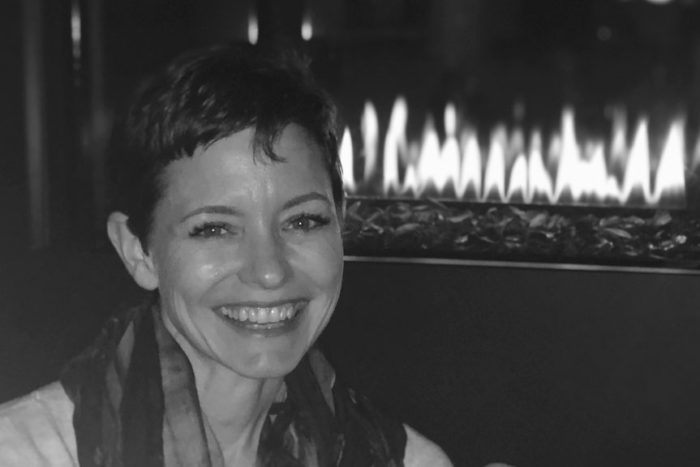
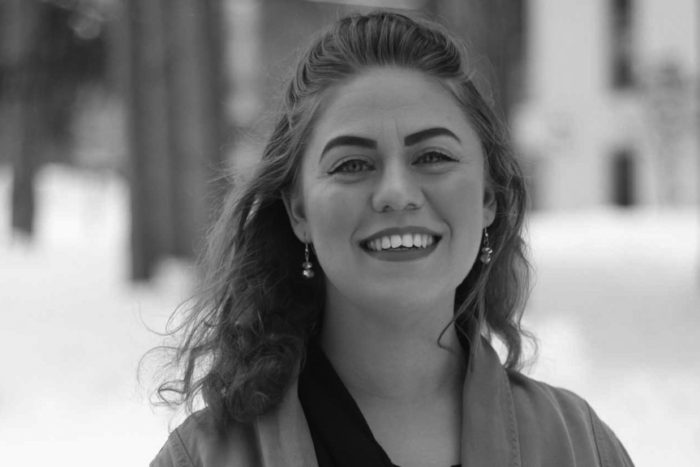
 Jayelle Seeley has called Syracuse, NY, home for the past 8 years. She is currently studying for her master’s degree mental health counseling. This is her first published piece.
Jayelle Seeley has called Syracuse, NY, home for the past 8 years. She is currently studying for her master’s degree mental health counseling. This is her first published piece.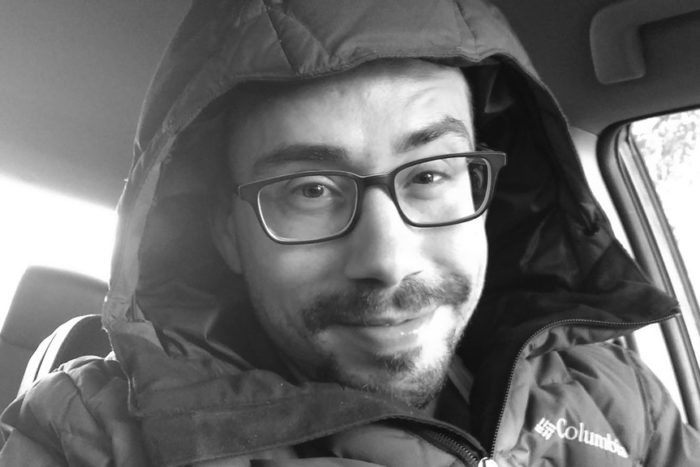
 M. A. Istvan Jr., PhD is a Texas citrus thief. He pinches not just a few grapefruits or oranges here and there. He has coordinated large crews to help him plunder entire acres in the secret of night. Most people stay out of Istvan’s vicinity. His hurried step, fierce expression, and wild hand gestures while speaking (speaking in what is best described as auditory cursive) set off the insanity-detectors ingrained in us by deep history.
M. A. Istvan Jr., PhD is a Texas citrus thief. He pinches not just a few grapefruits or oranges here and there. He has coordinated large crews to help him plunder entire acres in the secret of night. Most people stay out of Istvan’s vicinity. His hurried step, fierce expression, and wild hand gestures while speaking (speaking in what is best described as auditory cursive) set off the insanity-detectors ingrained in us by deep history.
 William Cass has had over 150 short stories accepted for publication in a variety of literary magazines such as december, Briar Cliff Review, and Conium Review. His children’s book, Sam, is scheduled for release in April, 2020. Recently, he was a finalist in short fiction and novella competitions at Glimmer Trainand Black Hill Press, received a Pushcart nomination, and won writing contests at
William Cass has had over 150 short stories accepted for publication in a variety of literary magazines such as december, Briar Cliff Review, and Conium Review. His children’s book, Sam, is scheduled for release in April, 2020. Recently, he was a finalist in short fiction and novella competitions at Glimmer Trainand Black Hill Press, received a Pushcart nomination, and won writing contests at 
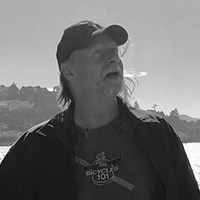 EG Ted Davis is a semi-retired working stiff and poet who resides in Boise, ID with his wife and their two rescue cats. He has various works that have appeared, or will appear, in several online literary journals – both in the US and in the UK.
EG Ted Davis is a semi-retired working stiff and poet who resides in Boise, ID with his wife and their two rescue cats. He has various works that have appeared, or will appear, in several online literary journals – both in the US and in the UK.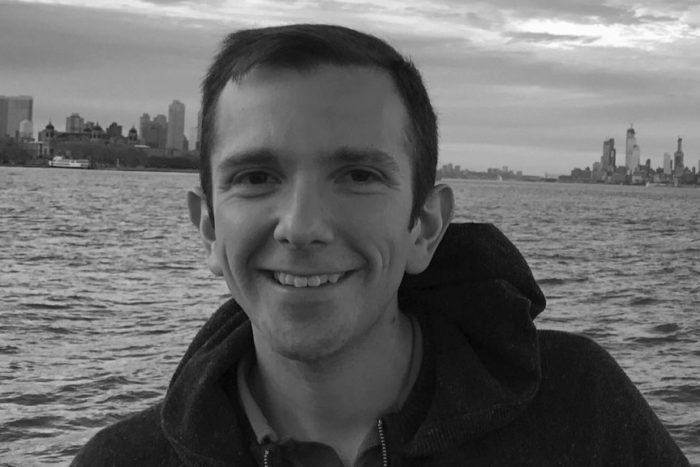
 Scott Bassis is a young writer eager to establish himself as a serious talent. He has had short stories published in Poydras Review, The Furious Gazelle, The Acentos Review, Open: Journal of Arts & Letters, Image Outwrite, Quail Bell Magazine, The Missing Slate, Jumbelbook, Furtive Dalliance, Fiction on the Web and Rainbow Curve.
Scott Bassis is a young writer eager to establish himself as a serious talent. He has had short stories published in Poydras Review, The Furious Gazelle, The Acentos Review, Open: Journal of Arts & Letters, Image Outwrite, Quail Bell Magazine, The Missing Slate, Jumbelbook, Furtive Dalliance, Fiction on the Web and Rainbow Curve.
 ADRIAN CREŢU is the author of the poetry book Orice om este un cântec fără rimă (Every human is a song without a rhyme), Junimea Publishing House, Iaşi, Romania, 2012. He has appeared in anthologies of Romanian modern poetry and participated in artistic residencies in Europe and the USA. From 2000 – present, his poems and articles have been published in: România literară, Tribuna (Cluj), Ateneu (Bacău), Cronica (Iași), Argeș (Pitești), Boema (Galați), Porțile Nordului (Baia Mare), Timpul (Iași), 13Plus (Bacău), Opinia studenţească (Iași), Alchemia (Israel), Ficțiuni.ro, Spații culturale (Râmnicu-Sărat), Constelații diamantine (Craiova), Astra băcăuană, POEZIA (Iași), Columnele vieţii (Bacău), Litera 13 (Brăila), Expres Cultural (Iași).
ADRIAN CREŢU is the author of the poetry book Orice om este un cântec fără rimă (Every human is a song without a rhyme), Junimea Publishing House, Iaşi, Romania, 2012. He has appeared in anthologies of Romanian modern poetry and participated in artistic residencies in Europe and the USA. From 2000 – present, his poems and articles have been published in: România literară, Tribuna (Cluj), Ateneu (Bacău), Cronica (Iași), Argeș (Pitești), Boema (Galați), Porțile Nordului (Baia Mare), Timpul (Iași), 13Plus (Bacău), Opinia studenţească (Iași), Alchemia (Israel), Ficțiuni.ro, Spații culturale (Râmnicu-Sărat), Constelații diamantine (Craiova), Astra băcăuană, POEZIA (Iași), Columnele vieţii (Bacău), Litera 13 (Brăila), Expres Cultural (Iași).
 Phil Gallos has been a newspaper reporter and columnist, a researcher/writer in the historic preservation field, and has spent 30 years working in academic libraries (which is more interesting than it sounds). Most recently, his writing has been published in The MacGuffin, Stonecrop Magazine, Carbon Culture Review, Burningword Literary Journal, and Foliate Oak, among others, and is forthcoming in The Wire’s Dream, and Dark Ink Magazine. He lives and writes in Saranac Lake, NY.
Phil Gallos has been a newspaper reporter and columnist, a researcher/writer in the historic preservation field, and has spent 30 years working in academic libraries (which is more interesting than it sounds). Most recently, his writing has been published in The MacGuffin, Stonecrop Magazine, Carbon Culture Review, Burningword Literary Journal, and Foliate Oak, among others, and is forthcoming in The Wire’s Dream, and Dark Ink Magazine. He lives and writes in Saranac Lake, NY.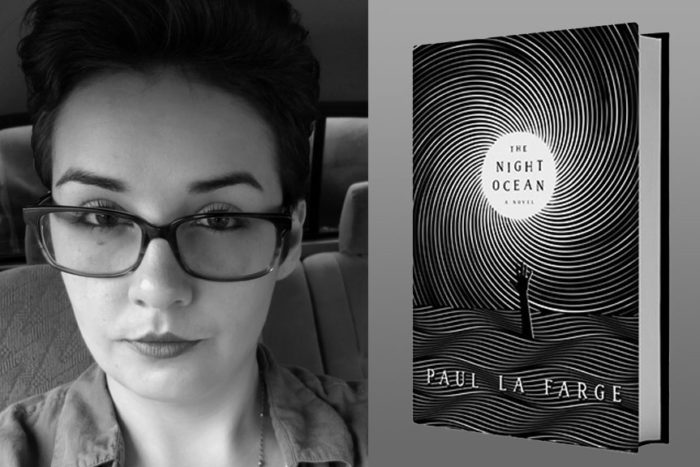
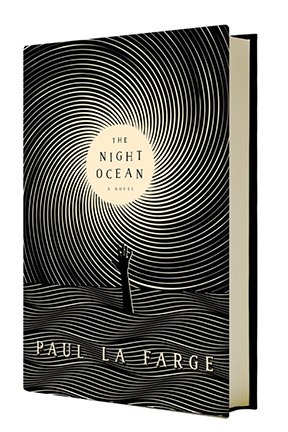
 Brittney graduated from Cal State Northridge with her bachelor’s in creative writing, and, after a short hiatus, found a master’s program in the same field through the University of Denver. Her goal to work in the publishing industry began when she served as editor for Cal State Northridge’s literary magazine’s spring 2014 issue, and has since been able to work with various publishers in both fiction and non-fiction.
Brittney graduated from Cal State Northridge with her bachelor’s in creative writing, and, after a short hiatus, found a master’s program in the same field through the University of Denver. Her goal to work in the publishing industry began when she served as editor for Cal State Northridge’s literary magazine’s spring 2014 issue, and has since been able to work with various publishers in both fiction and non-fiction.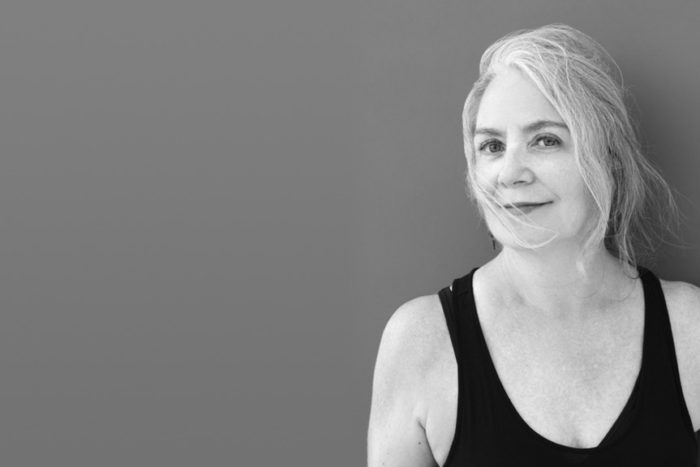
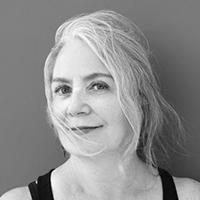 Susan E. Lloy has consistently published internationally since 2012. Her short story collection, But When We Look Closer, was recently published by Now Or Never Publishing. Her forthcoming collection, Vita, will be released April 15, 2019. Susan lives in Montreal.
Susan E. Lloy has consistently published internationally since 2012. Her short story collection, But When We Look Closer, was recently published by Now Or Never Publishing. Her forthcoming collection, Vita, will be released April 15, 2019. Susan lives in Montreal.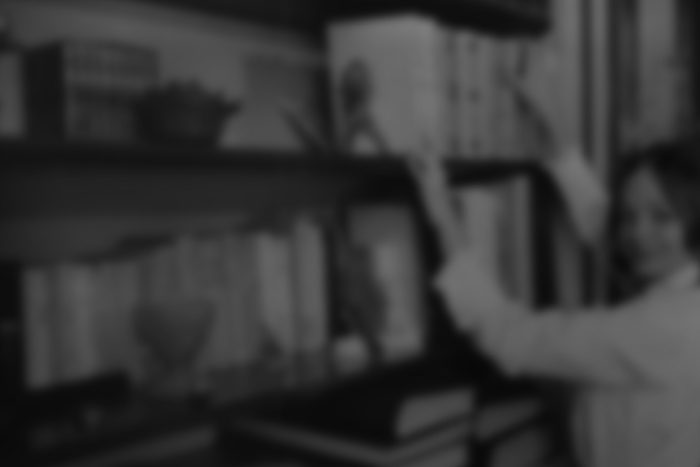
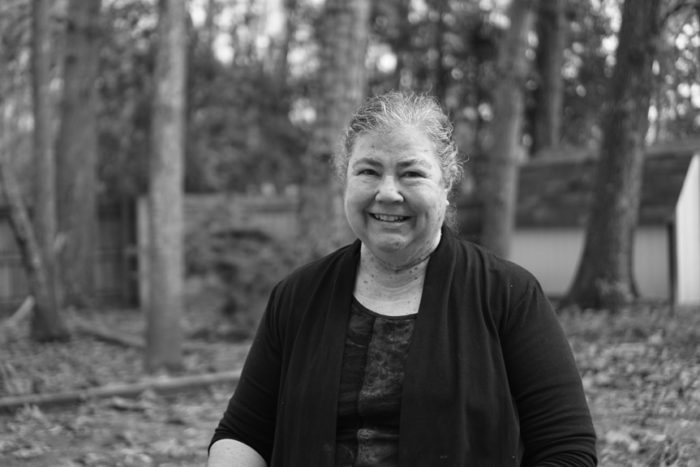
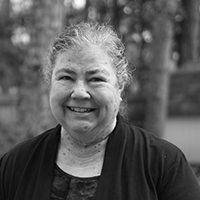 Deborah Morris is an Associate Professor at Methodist University in Fayetteville, NC, teaching physician assistant students. She uses art and literature to assist in teaching the art of medicine, and encourages reflective writing in her students. She writes primarily memoir and creative nonfiction and has published pieces in The Examined Life, Blood and Thunder: Musings on the Art of Medicine, GreenPrints, The Journal of Physician Assistant Education, and Clinical Advisor. When not teaching and writing she plays with her grandchildren, pulls weeds, pets her dogs and goats, cooks, and generally has fun.
Deborah Morris is an Associate Professor at Methodist University in Fayetteville, NC, teaching physician assistant students. She uses art and literature to assist in teaching the art of medicine, and encourages reflective writing in her students. She writes primarily memoir and creative nonfiction and has published pieces in The Examined Life, Blood and Thunder: Musings on the Art of Medicine, GreenPrints, The Journal of Physician Assistant Education, and Clinical Advisor. When not teaching and writing she plays with her grandchildren, pulls weeds, pets her dogs and goats, cooks, and generally has fun.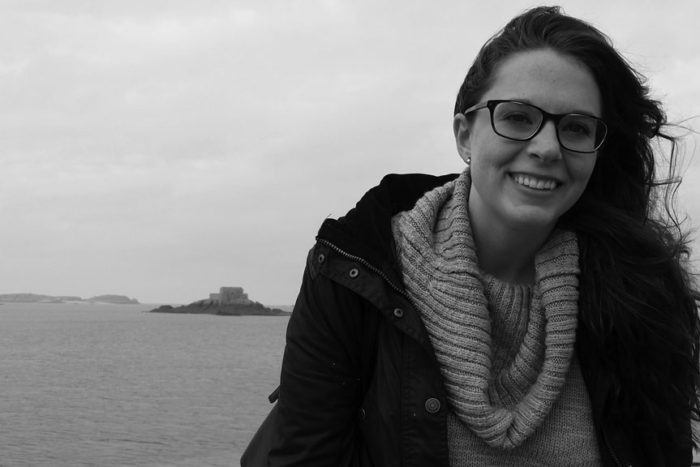
 Stephanie Mataya is a graduate of Western Washington University, and spent her days there writing stories and reading books. She was shaped by her West Coast upbringing, and has taken great joy and inspiration from living in New York, Paris, and currently, Canada. Previous work of hers has appeared in Your Impossible Voice and Scarlet Leaf Review.
Stephanie Mataya is a graduate of Western Washington University, and spent her days there writing stories and reading books. She was shaped by her West Coast upbringing, and has taken great joy and inspiration from living in New York, Paris, and currently, Canada. Previous work of hers has appeared in Your Impossible Voice and Scarlet Leaf Review.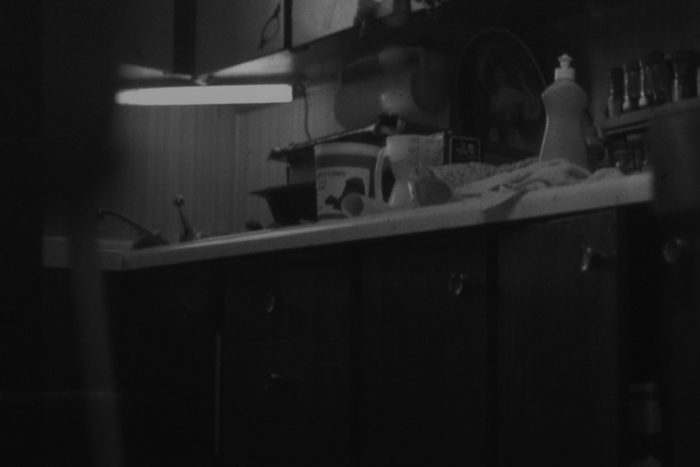
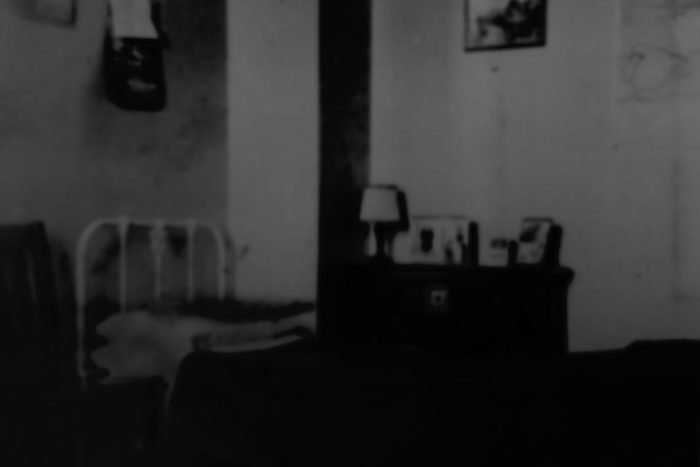

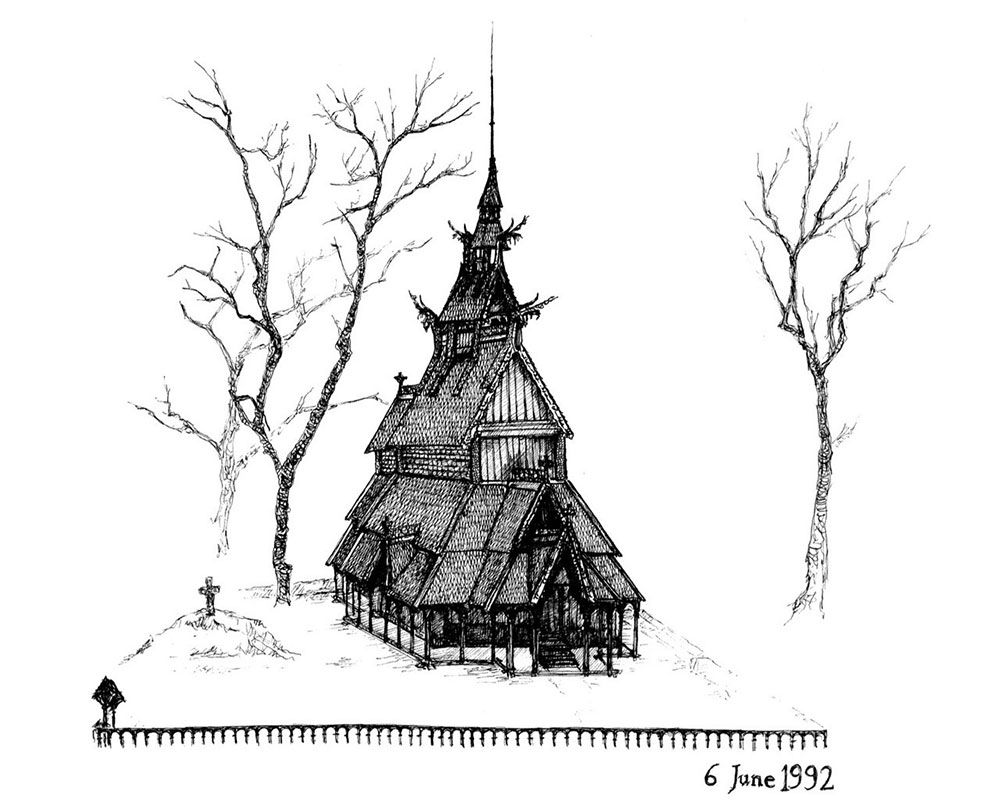


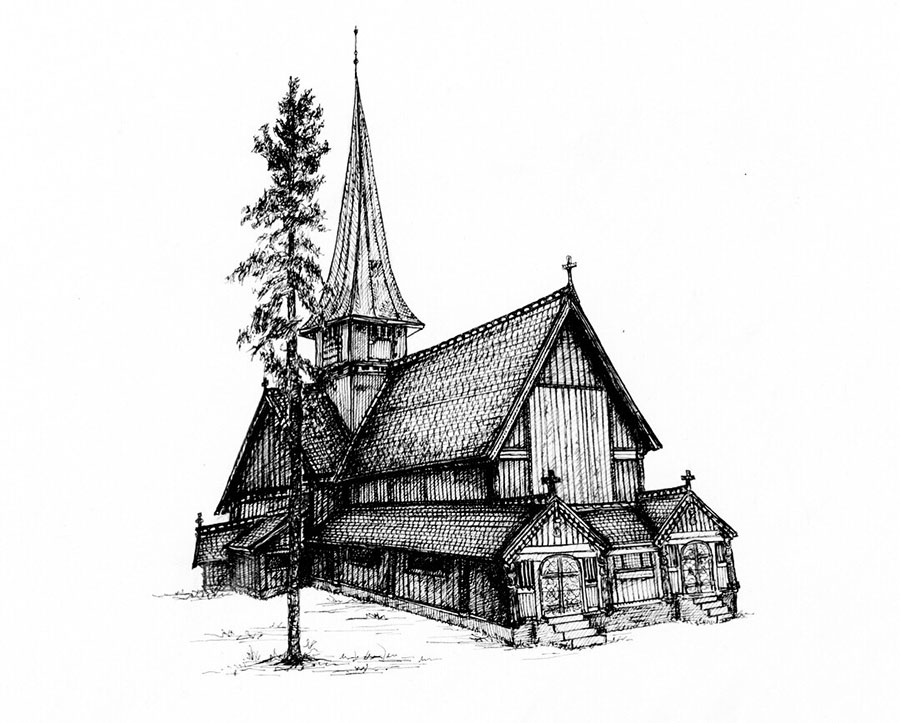


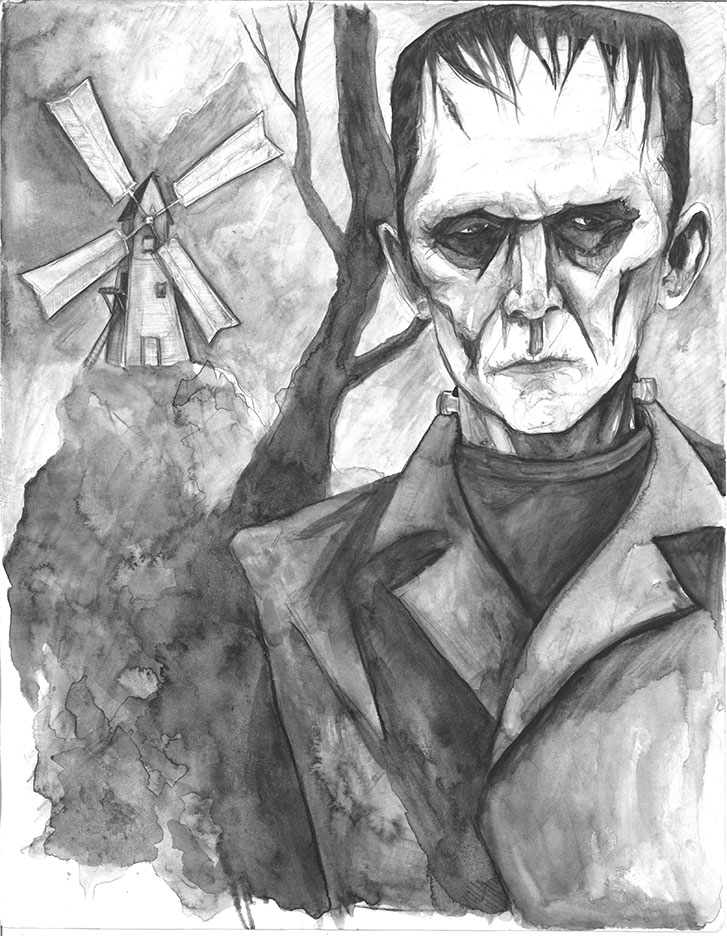

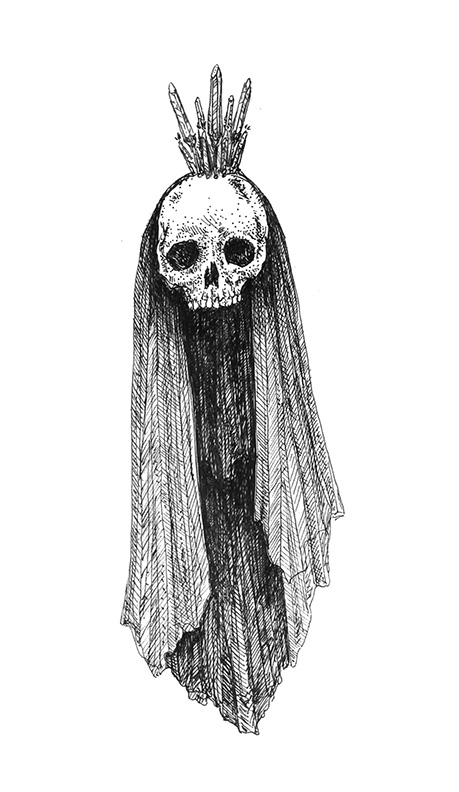
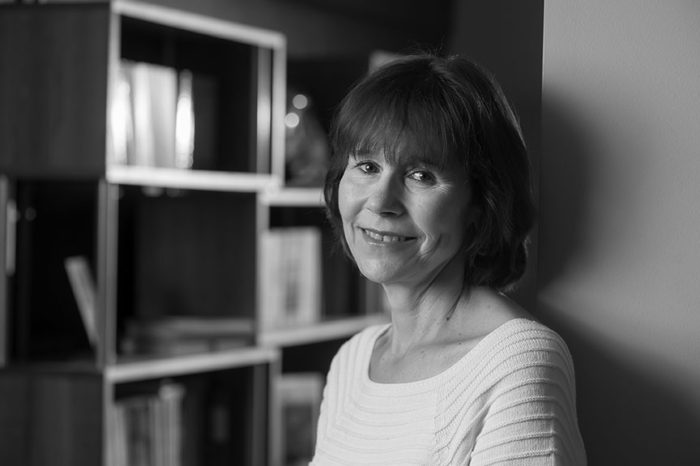
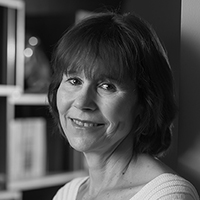 Evelyn Somers is the longtime associate editor of the Missouri Review and teaches writing and literature. She also serves as a staff writer for Bloom. Her work has appeared or is forthcoming in Georgia Review, Crazyhorse, the Millions, Florida Review, Southwest Review, South Dakota Review, Shenandoah, the Collagist, and Potomac Review, among many others. Her work in progress is a novel-in-stories about music, magic, and two warring female divinities.
Evelyn Somers is the longtime associate editor of the Missouri Review and teaches writing and literature. She also serves as a staff writer for Bloom. Her work has appeared or is forthcoming in Georgia Review, Crazyhorse, the Millions, Florida Review, Southwest Review, South Dakota Review, Shenandoah, the Collagist, and Potomac Review, among many others. Her work in progress is a novel-in-stories about music, magic, and two warring female divinities.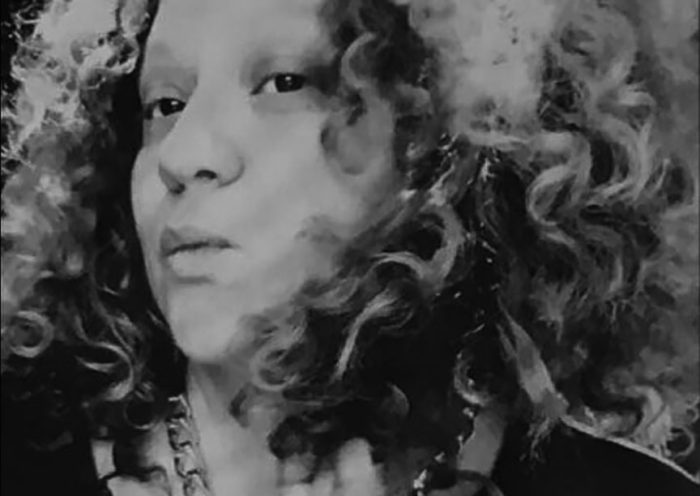
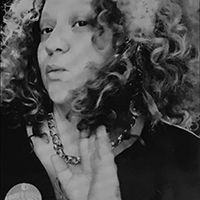 Amber is a self-taught, self-motivated, inspired and aspiring artist. Her work is primarily multi-media, 5-D abstract canvases. Amber found the Studio 526 more than three years ago through their yoga and meditation classes. The studio has moved her to open up her inner core and creatively throw it up on the canvas. She also takes advantage of the Studio 526 music room, playing multiple instruments, singing and dancing. She uses the audio equipment to compile clips for her DJ sessions. She also has creates one-of-a-kind jewelry. Her art has shown at Friends House Foundation, Skid Row History Museum, Bolt Barbershop. She’s an active participant with Zine Magazine festivals. She was honored to recite her own poetry at The Last Bookstore for Ivy Pochoda’s reception for her latest best-selling book “Wonder Valley”. Her dream for the future is to own her own gallery to display her own work and the works of any other creative individual no matter their creed, race or gender.
Amber is a self-taught, self-motivated, inspired and aspiring artist. Her work is primarily multi-media, 5-D abstract canvases. Amber found the Studio 526 more than three years ago through their yoga and meditation classes. The studio has moved her to open up her inner core and creatively throw it up on the canvas. She also takes advantage of the Studio 526 music room, playing multiple instruments, singing and dancing. She uses the audio equipment to compile clips for her DJ sessions. She also has creates one-of-a-kind jewelry. Her art has shown at Friends House Foundation, Skid Row History Museum, Bolt Barbershop. She’s an active participant with Zine Magazine festivals. She was honored to recite her own poetry at The Last Bookstore for Ivy Pochoda’s reception for her latest best-selling book “Wonder Valley”. Her dream for the future is to own her own gallery to display her own work and the works of any other creative individual no matter their creed, race or gender.
 Kobina Wright is a second generation California native with a degree in Communications from California State University, Fullerton. Wright is an artist, writer and entrepreneur and is a board member of The G.R.E.E.N. Foundation, an organization that helps to service the community through health education and navigation to support individuals and families to access quality health care.
Kobina Wright is a second generation California native with a degree in Communications from California State University, Fullerton. Wright is an artist, writer and entrepreneur and is a board member of The G.R.E.E.N. Foundation, an organization that helps to service the community through health education and navigation to support individuals and families to access quality health care.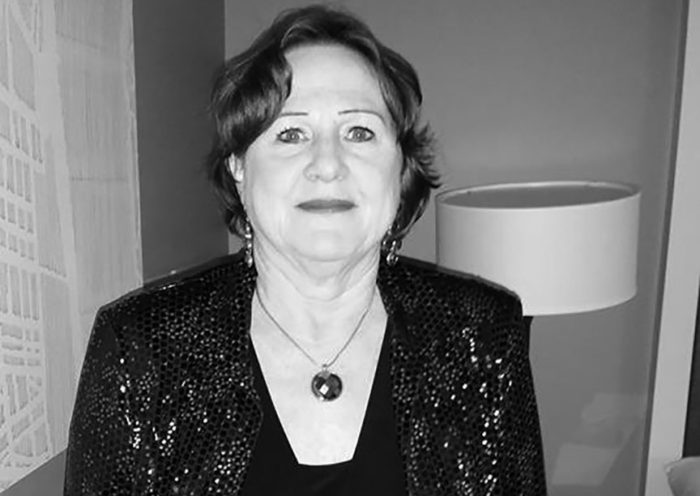
 Mary Bone has been writing since the age of twelve. Some of Mary’s poems can be found in the Fall issue of The Homestead Review Online, Literary Yard, Oklahoma today, Poetry Pacific, Magazine Record Blogspot, The New Ink Review, Our Poetry Archive and The Writing Disorder.
Mary Bone has been writing since the age of twelve. Some of Mary’s poems can be found in the Fall issue of The Homestead Review Online, Literary Yard, Oklahoma today, Poetry Pacific, Magazine Record Blogspot, The New Ink Review, Our Poetry Archive and The Writing Disorder.











